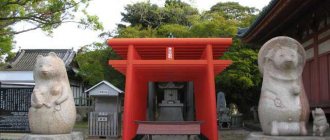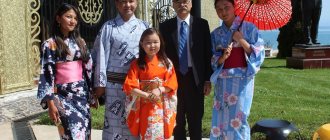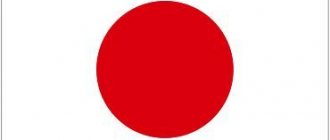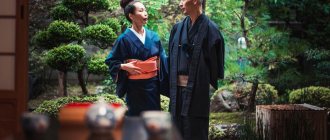Fish is the basis of everything
One of the secrets of why the Japanese live the longest is their diet. The basis of their menu is fish, a huge amount of vegetables and fruits, soy and tofu. Due to the fact that the Japanese eat large quantities of fish, their bodies receive sufficient amounts of omega-3 fatty acids, which reduces the risk of cardiovascular diseases. Most of all, Japanese people love red fish.
The Japanese diet also includes a lot of fruits and vegetables. But the most important thing: they are all fresh, not subjected to heat treatment. Residents of the Land of the Rising Sun also love algae and soy. These products are highly nutritious, but low in calories, which allows the Japanese to remain slim.
Why do the Japanese live the longest in the world?
Residents of the Land of the Rising Sun have the highest life expectancy among the entire population of the planet. Women in Japan live to an average of 86 years of age and men to 79 years of age, higher than any other developed country in the world. Many tourists visiting this country note that the Japanese look very young, slim and energetic. Even older people lead an active lifestyle, ride bicycles, play sports and look younger than their age.
It is worth mentioning that the Japanese, for the most part, are terrible workaholics. They work almost seven days a week, and the statutory duration of annual leave is 18 days, although on average this figure does not exceed 8 days. The Japanese smoke quite a lot and drink alcohol regularly. And the terrible nuclear disasters the country suffered, Hiroshima and Nagasaki in 1945, as well as Fukushima in 2011, do not in any way contribute to a healthy and long life.
All this forces scientists around the world to look for the answer to this island phenomenon. And now numerous researchers of Japanese longevity presented their findings to the public. It turns out that it's all about the Japanese way of life.
First of all, these are nutritional features. The culture of eating in Japan is very similar to the list of recommendations from a book about proper nutrition. They drink a lot of water and green tea, eat small portions and try to eat only fresh foods that have not been subjected to long-term storage or preservation.
The Japanese diet contains a large amount of fish, fresh fish, which is important. Each resident of the Land of the Rising Sun eats an average of 68 kilograms of fish per year, which is 4 times higher than in other countries. It is an excellent source of omega-3 polyunsaturated fatty acids, selenium and iodine, which contribute to the healthy functioning of the cardiovascular system and the entire body. At the same time, the Japanese consume 2-3 times less meat (beef, poultry) than residents of Europe or America.
The second feature of the Japanese diet is the consumption of large quantities of fresh vegetables and fruits, as well as seaweed, with minimal heat treatment. These foods are very rich in vitamins and minerals and have virtually no calories. In addition, they hardly consume bread and eat rice instead.
In addition to proper, fresh and vitamin-rich food, the Japanese are also distinguished by the fact that they eat less compared to Europeans. This applies not only to the size of portions, but also to the amount of sweets. For example, a Japanese cake is three times smaller than a Russian one. And of course, it is worth mentioning green tea. The Japanese drink a lot of green tea, which is good for health and strengthens the immune system. In some cases, they not only drink it, but also eat the leaves. They also drink a lot of water, not only when they are thirsty, but also simply throughout the day. The island nation is also a consumer of a large number of nutritional supplements and vitamin complexes designed to promote health and prolong life.
The second important component of the Japanese lifestyle is high mobility. They travel a lot on foot and by bicycle, and drive cars less than Europeans. Japanese people, and even older Japanese people, love to play golf croquet. Centenarians who participated in the studies advise walking at least 10,000 steps a day, which is about 6 kilometers.
The third important component of Japanese life, which researchers note, is their attitude towards the surrounding nature and inner peace. The Japanese live in harmony with their nature, and the famous Japanese gardens and bonsai are not relics of the past or a tribute to tradition. Most Japanese of the older generation always have a favorite tree in their garden, in the yard or on the windowsill, which they take care of and devote a lot of time to. Their entire existence is permeated with concern for nature, because more than 125 million people live in a small area, and in order to preserve their country for future generations, they do a lot to protect nature.
Long-livers of the Land of the Rising Sun often give advice on how to live correctly in order to be in harmony with oneself and others. They recommend smiling more often, doing good deeds, enjoying children and not being upset about the lack of money or material goods. Elderly Japanese also advise us to accept with gratitude everything that life gives us and not to be offended by people. Perhaps the love of life is the most important thing that allows the Japanese to live to a ripe old age.
Easy to prepare
An important reason why the Japanese live longer than others is the way they cook. They try to cook in such a way that the products retain as many useful substances as possible. Japanese housewives skillfully handle rich sauces and use seasonings delicately.
Another important difference between Japanese cuisine and the rest is that in cooking, housewives use rapeseed oil or broth made from fish and seaweed. This allows you to get a dish that is nutritious, but not high in calories.
The main thing is to move a lot
One of the main secrets of why the Japanese live the longest in the world is that they move a lot at any age. Residents of the Land of the Rising Sun walk more often than others, ride bicycles and travel less by car. Most people think that an active lifestyle means playing sports. Of course, sports activities are also important, but the Japanese mean that a person must be in motion all the time.
This can include household chores, walking and sports. Japanese researcher Yoshiri Hotano proposed one of the activity models: walk 10,000 steps daily. Such physical activity reduces blood pressure, helps a person stay slim and stay healthy for as long as possible.
Healthy lifestyle of the Japanese
Since childhood, the Japanese have led an active lifestyle, practicing martial arts, especially karate. They prefer to walk or ride bicycles, and often climb stairs. People drive cars less often than in other countries. Therefore, if you want to be beautiful and healthy, you need to take 10,000 steps a day.
By adopting this lifestyle, you can easily lose weight and improve your health. In addition, Japanese centenarians claim that an active lifestyle prolongs life. Here are some effective tips:
- sleep less, move more;
- if you want to live a long time, change your usual diet and switch to plant foods;
- do breathing exercises;
- you should eat seafood high in iodine;
If you apply these tips in life, you can not only become healthy, but also extend your life by several decades.
Tea ceremony
Why do the Japanese live longer than others? One of the reasons is the great popularity of green tea among Japanese residents. In general, the Japanese pay special attention to the tea ceremony; for them, drinking tea according to all the rules is a real art. And in restaurants, visitors are offered green tea for free.
Over the years, it has become an ingredient in some dishes. The Japanese have always associated green tea with health and longevity. It contains as many useful substances as vegetables and fruits, and much less caffeine.
Life expectancy in Japan
In 2021, Japan's population will decrease by -149,291 and end the year at 126,368,572. Natural population growth will be negative and amount to 218,876 people. Over the entire year, approximately 1,048,833 children will be born and 1,267,709 people will die. If the level of external migration remains at the level of last year, then due to migration reasons the population will change by 69,585 people. That is, the total number of people entering the country for the purpose of long-term stay (immigrants) will be greater than the number of people leaving the country (emigrants).
Below are the coefficients of change in the population of Japan, calculated by us for 2021:
- Birth rate: average 2,874 children per day (119.73 per hour)
- Deaths: average 3,473 per day (144.72 per hour)
- Migration population growth: average 191 people per day (7.94 per hour)
Japan's population will be declining by 409 people daily in 2021.
According to our estimate, at the end of 2021, the population of Japan was 126,517,863. During 2021, Japan's population decreased by approximately 149,467 people. Given that Japan's population was estimated at 126,667,330 at the beginning of the year, the annual growth rate was -0.12%.
Here are Japan's main demographic indicators for 2021:
- Births: 1,050,072 people
- Deaths: 1,269,207 people
- Natural population growth: -219,134 people
- Migration population growth: 69,667 people
- Males: 61,636,908 (est. 31 December 2020)
- Women: 64,880,955 (est. December 31, 2020)
| Religion | Number of followers | Percentage of total population |
| Non-religious and atheists | 72 104 924 | 57.0 % |
| Buddhism | 45 792 951 | 36.2 % |
| Other | 5 818 994 | 4.6 % |
| Christianity | 2 023 998 | 1.6 % |
| Folk beliefs | 505 999 | 0.4 % |
| Islam | 253 000 | 0.2 % |
Train your brain
Why do the Japanese live long and not age? Because they understand that it is important not only to take care of the body, but also to train their mind. What does it mean? This means that you need to strive to gain new knowledge, new impressions. Even philosophical reflections will do.
The main thing is to prevent your brain from constantly being in a routine. Because a decrease in mental activity leads to a person’s reaction to life events slowing down. This is why it is so important to give the brain new information to maintain its activity.
How to find meaning in your life?
There is no single recipe that would suit any person. A person must look at his life from all sides. It is recommended to answer all these points in detail and write down the answers:
- write what you like to do - these are not two or three answers, gradually you will remember all your favorite things and activities, write them down and highlight those you especially liked;
- write down what you know how to do - all things related to any areas of life;
- describe what you get money for - this is a salary, any income, and what you were ever paid for;
- write what you think people need - everything that brings joy to all your loved ones and strangers.
You should answer extremely honestly, without checking the previous points. Try to find common ground in these points, something that unites them. This is exactly what will be your meaning in life, the path of development and the key to longevity. This does not mean that you will be able to find it in a day or even a month. You may spend a long time on this, gradually adding and deleting different answers, but if you find it, life will be filled with new meaning.
Subscribe to our INSTAGRAM account!
Be optimistic
One of the secrets of Japanese longevity is the ability not to focus on the situation. It is important to be able to remain optimistic, because then there is a much greater chance of finding a way out of the situation. After all, most often experiences and stress are unproductive and can negatively affect a person’s condition.
The Japanese are polite towards each other and tourists. It is considered natural for them to wish a stranger a good day. They also try to smile more: their mood will improve and the day will be more productive.
The Japanese do not age thanks to hygiene and medical care
Everyone knows that Japanese medicine is at an extremely high level. In this country, doctors are highly qualified, and the latest achievements of science and technology are used as medical equipment. At the same time, this is a nation in which there are not so many sick people.
The Japanese rarely suffer from heart disease; their blood vessels, stomach and intestines are in order. Only three out of a hundred people are diagnosed with extra pounds. As a rule, if a Japanese person visits a clinic, it is for preventive purposes. What Japan doesn’t have is self-medication, but here they always listen to doctor’s advice.
The Japanese are called terrible cleaners, and this is the true truth. Citizens of this country cannot be found with dirty hands, teeth, body or clothes. Cleanliness is a requirement for everyone. Therefore, the spread of infection here is very rare. This is also considered respect not only for yourself, but also for the people around you.
Studying the issue of longevity of the Japanese, scientists concluded that it is caused by proper nutrition, an active lifestyle, hygiene and preventive visits to doctors, as well as a harmonious feeling of oneself in the world around us.
Become true masters in your field
The Japanese pay much more attention to finding their purpose. For them, work is more than just making money. They believe that every person should become a true master in their field and strive for this. And by the way: you should only do what brings you joy.
Work plays a big role in the life of the Japanese, because they work much more than others. For residents of the Land of the Rising Sun, recycling is considered normal. Therefore, it is not surprising that they try to find something that will bring them pleasure.
The Japanese believe that you need to constantly develop yourself. Therefore, they try to constantly exercise their body and their mind. Also, residents of the Land of the Rising Sun believe that every person has his own calling, a talent that he must reveal. Only then will he be able to realize his potential and become a true master of his craft.
Why do the Japanese live longer than Europeans? Their difference from other nations is that even in the rhythm of big cities, they try to find time to think about important things. They treat people with respect and have a special philosophy of life. The Japanese have a different approach to work: it doesn’t matter how much a person earns, the main thing is that his work brings him pleasure.
The Japanese pay equal attention to appearance and inner world, continuing to lead an active lifestyle at any age. Their ideology is distinguished by thoughtfulness and careful attention to detail. They won’t eat on the go, mindlessly chewing their food: it’s not for nothing that Japan has a tradition of making bento, and some of them look like a real work of art. This special philosophy is the basis of the longevity of the Japanese.
Philosophy of life
Researchers have found that the majority of centenarians have acquired “ikigai,” which can be translated as the meaning of life. “Iki” is translated from Japanese as life, and “gai” can be translated as path or reason. In a broad sense, this translation can be interpreted as “that which gives joy and a reason to wake up in the morning, gives meaning to each new day.”
A person who has found meaning in his life wakes up and falls asleep with the feeling that he is in his place, is needed by someone, and is doing his job. He greets the morning with joy, since his life is filled with important and necessary things, and a night's rest gives him the opportunity to recover physically and mentally in order to continue his favorite activity the next day.
Anyone who has found meaning in life fills their days with joy and tranquility. After all, then he knows why he performs certain actions, why this work is required, why certain things are needed, or why he does not need unnecessary things. This person feels needed, useful for his family or society. He develops and clearly sees his results, feels full of strength at any age.











